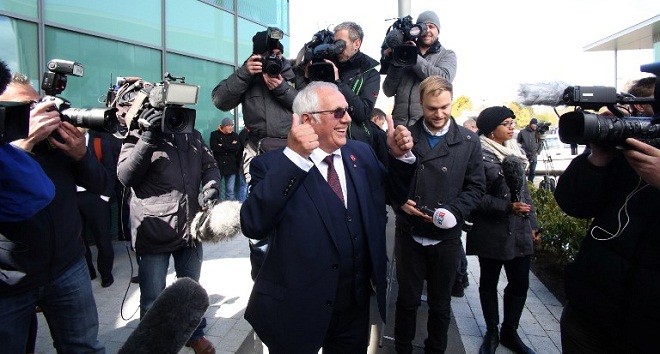
Warrington, United Kingdom | AFP |
The 96 Liverpool fans who died in the Hillsborough football stadium disaster were unlawfully killed, a jury concluded Tuesday, finding Britain’s worst sporting tragedy was partly down to police errors.
Following the biggest inquest in English legal history, jurors concluded that policing decisions at the ill-fated match in 1989 “caused or contributed” to the deaths, and amounted to “gross negligence”.
Relatives of the victims have fought a 27-year campaign to get to the heart of what happened during the disaster, and were incensed by a 1990 inquest ruling the deaths were accidental.
In emotional scenes, they emerged from the courtroom hugging and in tears.
They linked hands and sang the Liverpool Football Club anthem “You’ll Never Walk Alone” and chanted “Justice for the 96!”.
“You will not believe what we have gone through to achieve justice,” said Barry Devonside, who lost his only son, 18-year-old Christopher.
There were shouts of “Yes!” in court when the jury’s verdicts were delivered, with people jumping to their feet.
“It was fantastic to hear those words,” said Devonside.
Relatives stood and applauded the jurors as they left court.
Prime Minister David Cameron paid tribute to their “extraordinary courage” in their “long search for the truth”, saying the inquest provided “long overdue justice”.
Home Secretary Theresa May, the interior minister, will set out the government’s official response on Wednesday.
The Crown Prosecution Service (CPS), England’s state prosecutors, said it would consider whether to bring charges once ongoing criminal investigations conclude.
Policing ‘catastrophically wrong’
The disaster occurred on April 15, 1989 during an FA Cup semi-final between Liverpool and Nottingham Forest at Sheffield Wednesday’s Hillsborough stadium in northern England.
Seeking to alleviate a crush that had developed outside the ground at the Leppings Lane End shortly before kick-off, David Duckenfield, the police match day commander, ordered the opening of an exit gate.
It enabled 2,000 fans to surge into the already over-full terracing pens behind the goal at that end, causing a fatal crush. Some 38 of the victims were aged 10 to 19.
The mammoth inquest, which began in March 2014, took place in a purpose-built courtroom in Warrington, northwest England, 15 miles (25 kilometres) outside Liverpool. It head from more than 800 witnesses.
Coroner John Goldring, who presided over the inquests, asked the nine-member jury to decide on 14 key points — with the issue of whether the victims were unlawfully killed the central question.
The jury members had to be convinced that Duckenfield had a duty of care to those who died, whether he breached that duty, and caused the deaths in doing so.
They also had to be satisfied that the breach amounted to “gross negligence”.
South Yorkshire Police chief David Crompton said the force “unequivocally” accepted the verdicts, saying they got the match policing “catastrophically wrong”.
“The force failed the victims and failed their families.
“I want to apologise unreservedly to the families and all those affected.”
The jury also concluded that the behaviour of Liverpool supporters did not cause or contribute to the crush outside the ground.
The tragedy occurred when English football hooliganism was at its height and many in authority were prepared to believe the worst of fans.
Truth, justice, accountability
Under English law, an inquest exists solely to determine how the deceased came by their death.
Two criminal probes should report before 2017: one into the disaster and another into the police handling of the aftermath. The CPS will decide whether to bring charges, based on their findings.
A 1990 report into the disaster recommended removing terrace fences and introducing of all-seater stadiums, which has transformed the experience of attending top-flight football in England.
But also that year, prosecutors deemed there was insufficient evidence to bring criminal charges against the police or any other individual or group.
A year later the original coroner’s inquest returned verdicts of accidental death.
Many of the victims’ families felt this was a whitewash and began their lengthy campaign for fresh inquiries.
In 2009, the Hillsborough Independent Panel was set up. Its 2012 report found that police orchestrated a cover-up, manipulated documents and blamed innocent supporters for the disaster.
Their findings led to the establishment of the new inquests.
An event marking the inquests’ outcome will be held in Liverpool on Wednesday, which thousands are likely to attend.
 The Independent Uganda: You get the Truth we Pay the Price
The Independent Uganda: You get the Truth we Pay the Price



